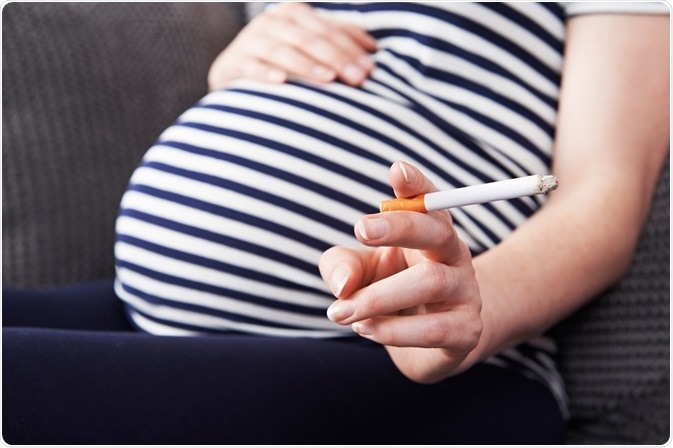Smoking during pregnancy causes serious health problems to both mother and child. A single cigarette contains about 4,000 chemicals, of which 70 have enough potential to cause cancer.
 Credit: SpeedKingz/ Shutterstock.com
Credit: SpeedKingz/ Shutterstock.com
These chemicals eventually affect the growth of the fetus by narrowing the oxygen and nutrient supply, ultimately leading to various critical complications during pregnancy and childbirth. In the USA, studies conducted by various researchers have revealed that about 12–20% of women smoke during pregnancy, and around 1,000 stillbirth cases are recorded annually.
Smoking during pregnancy may adversely impact a child’s mental and behavioral development and may lead to hyperactivity. Passive smoking can also cause serious fetal developmental issues in the womb with respiratory ailments like asthma and lung infections in newborns.
Harmful effects of smoking
Harmful chemicals such as nicotine, arsenic, lead, carbon monoxide, and cyanide are found in a cigarette. The fetus of a pregnant woman who smokes is exposed to these harmful substances. As a result, the blood vessels of the fetus are blocked, leading to a reduced supply of oxygen and nutrient-rich blood from entering the placenta, along with a rapid increase in the baby’s heartbeat.
Due to these factors, the development of the fetus may be abnormal, leading to a fetus with a weak immune system or other ailments and severe pregnancy complications. There are three medical conditions that may develop due to smoking: low-birth weight, preterm delivery, and infant death.
Impact of smoking during gestation
Smoking triggers higher genetic abnormalities in the development of a fetus. Risks of in the following medical conditions are found to be higher in women that smoke compared with other pregnant women.
- Rupture of placenta: In this condition, separation of the placenta from the uterus wall occurs during the final trimester of pregnancy, resulting in huge blood loss. This is the most serious condition that can affect both the baby and the mother.
- Preterm premature rupture of the membranes (PPROM): Here, the amniotic sac ruptures before the 37th week of gestation, leading to preterm labor before the complete development of the fetus.
- Vaginal bleeding: During the early stages of pregnancy, vaginal bleeding is the sign of many complications like ectopic pregnancy, miscarriages, and molar pregnancy. Vaginal bleeding causes severe cramps (abdominal pain) and pelvic pain.
- Miscarriage: Miscarriage occurs during the first trimester of pregnancy as a result of chromosomal alterations triggered by increased exposure to smoking.
- Ectopic pregnancy: Smoking increased risk of ectopic/tubular pregnancy, where the fertilized egg grows inside the fallopian tube rather than in the uterus. If the condition is left undiagnosed, it leads to severe detrimental effects.
Effects of smoking during childbirth
Smoking induces several critical conditions during childbirth such as the following:
- Low birth weight babies: This is a term that describes newborn babies with a body weight of less than 2,500 grams (5 pounds, 8 ounces). Babies born to women smokers usually have low birth weight.
- SIDS: Sudden infant death syndrome (SIDS) or Cot’s disease is an unexplained sudden mortality of the baby. After birth, infants exposed to environmental tobacco smoke are more prone to SIDS. The chemicals involved in this smoke can damage the brain and also interfere in proper respiration. Infants usually die due to the greater nicotine and cotinine concentrations in their lungs. The chances of this condition may occur even after one year of the infant’s birth.
- Abnormalities/birth defects: The infant’s growth is seriously impacted due to several abnormalities that may be seen in the organs of the infant. These birth defects include breathing or respiratory problems; difficulties in feeding, thinking, and speaking; cerebral palsy; eyesight and hearing problems; ear infection, and delay in growth.
- Stillbirth: This condition is more common where infants are born dead or will die shortly after birth. The risk of occurrence of this condition has smoking as a primary cause in one of every three cases.
Passive smoking effects on pregnancy
Passive smoking or second-hand smoking is a situation in which pregnant women are exposed to smoke by unconscious inhalation of smoke from cigarettes smoked by their partner or people around them.
The American Lung Association states that passive smoking also harms the fetus during pregnancy and can cause diseases like pneumonia and bronchitis in infants during or after birth. The breathing of the fetus inside the womb is inhibited by passive smoking pregnant mothers, leading to a pathogenesis of such diseases.
Researchers have found that third-hand smoking is also possible. This is via the gases or toxin residues of cigarettes in the environment (in clothes, bed, and carpet). These tends to cause cancer and other breathing problems, including asthma.
Vitamin C supplements are given to female smokers in their gestation period, in order to neutralize the negative impacts on the infant’s pulmonary function. Apart from this, discontinuation of smoking will be effective in safe guarding both the baby and the pregnant mother during this period.
Sources:
- www.nhs.uk/conditions/pregnancy-and-baby/pages/smoking-pregnant.aspx
- www.mayoclinic.org/…/art-20047021
- www.healthychildren.org/…/…-We-Stand-Smoking-During-Pregnancy.aspx
- www.cdc.gov/…/index.htm
- americanpregnancy.org/…/
- www.rcog.org.uk/…/pi-smoking-and-pregnancy-2.pdf
- www.health.nsw.gov.au/tobacco/Factsheets/smoking-and-pregnancy.pdf
- https://www.womens-health.co.uk/smoking-and-miscarriage.html
- https://www.cdc.gov/tobacco/campaign/tips/diseases/pregnancy.html
Further Reading
- All Pregnancy Content
- Early Signs of Pregnancy
- Is it Safe to Exercise During Pregnancy?
- Pregnancy: 0-8 weeks
- Pregnancy: 9 – 12 weeks
Last Updated: May 27, 2019
Source: Read Full Article